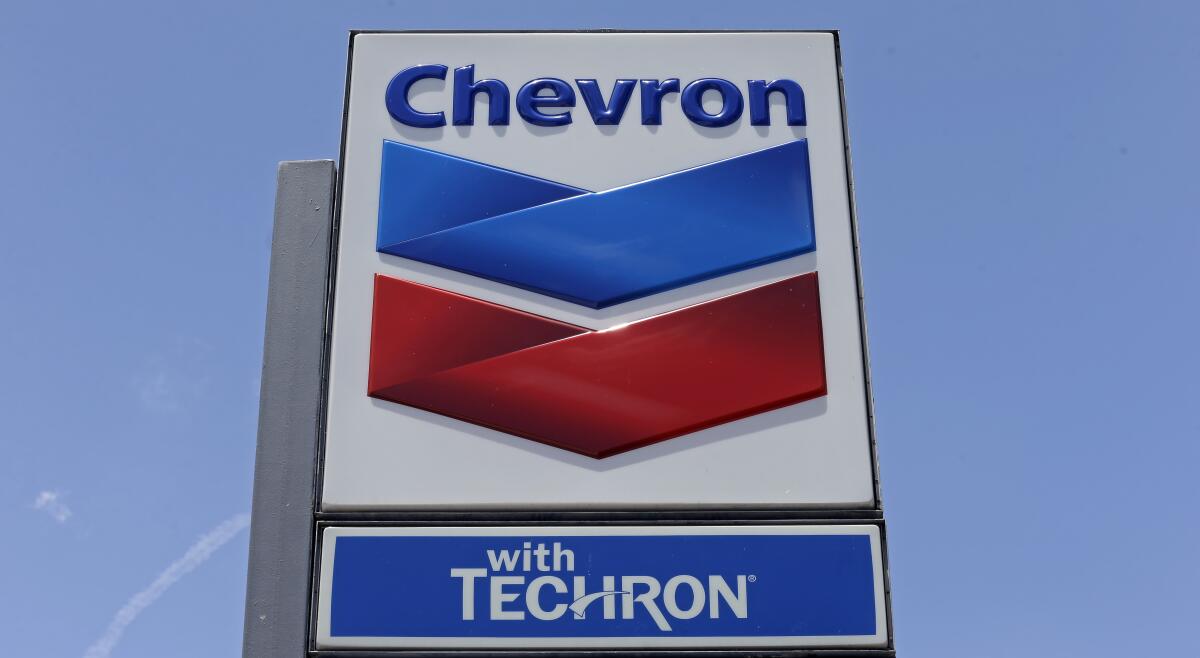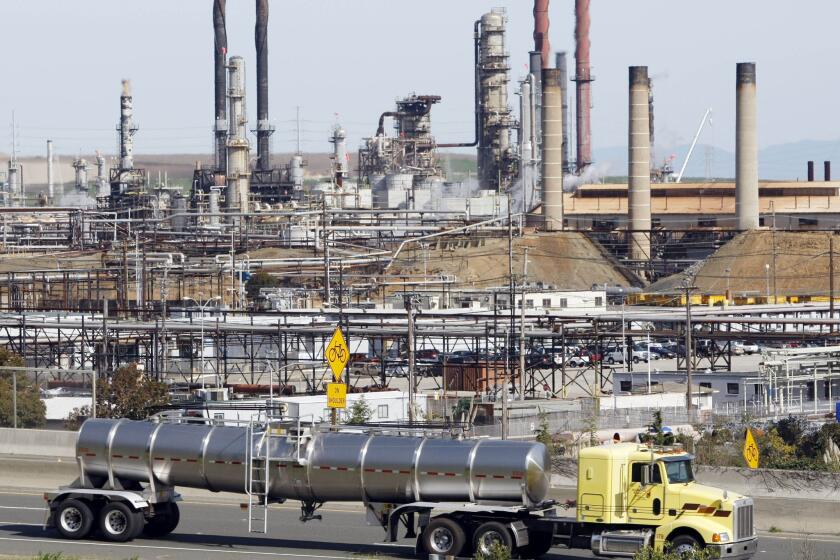Column: Chevron builds a ‘newsroom’ to tell stories it doesn’t think an independent press will cover

- Share via
Mother Nature, as the adage goes, must really abhor a vacuum. The evidence is how assiduously she has filled the ever-expanding vacuum in local and investigative news with fakery on a scale that gives the very concept of vacuums a bad name.
The newest example comes to us from Chevron Corp., which is no novice in the practice of dressing up corporate PR to look like objective news.
Through the headhunting firm Cella, Chevron lately has been posting a recruiting ad for a business writer to become “an integral member of the ‘newsroom’ team.” (Quote marks in the original.)
An essay’s fundamental obligations are supposed to be to the reader. But a commercial is a very different animal. ... [Its] primary obligation ... is to serve the financial interests of its sponsor.
— David Foster Wallace
The successful applicant will report to the so-called newsroom’s managing editor, fulfilling Chevron’s mission “to proactively tell our story through engaging, consumer-first digital content” by creating “digital news articles, video scripts, newsletters, and social media posts.”
The Cella posting didn’t identify Chevron as the client, mentioning only that the job would be in the “oil and energy” field. But the giant oil company fessed up.
Get the latest from Michael Hiltzik
Commentary on economics and more from a Pulitzer Prize winner.
You may occasionally receive promotional content from the Los Angeles Times.
It could hardly do otherwise, because the headhunters reached out proactively, as it were, to a reporter for the energy and environment news site E&E News, who blew the whistle.
“Just like other companies, we are working to evolve the way we create and deliver our branded content to readers, both internal and external,” Chevron spokesman Braden Reddall told me by email. “These are stories that can be leveraged across our digital ecosystem: chevron.com, newsletters, social media, paid search, and the internal news site.”
Put that way, it sounds like just another version of corporate public relations. Lots of companies describe their PR operations as “newsrooms.”
Fewer, however, describe their leaders as managing editors or their products as “news articles,” adopting more of the nomenclature of mainstream journalism. Chevron is further requiring applicants to have at least a bachelor’s degree in “journalism, communications or marketing” and five years’ experience in journalism or those other fields.
Chevron’s effort, like those of other big enterprises, is designed to preempt reporting it can’t fully control, because the latter is produced by independent and objective news organizations. By “proactively” telling its story, as the job listing states, its aim is to muddy the waters of oil company coverage by getting its defense before the public even before critical articles appear.
What’s insidious about this is the blurring of the line between news and propaganda, vastly in favor of propaganda. What enables it is the shrinking of the news industry as once-robust newspapers, magazines and television news divisions become ever more underfunded and unable to give influential politicians and businesses a healthy dose of scrutiny.
If you happened to click Monday on the Richmond Standard, a community news site for that Bay Area locality, you would have come upon a fairly snarky piece about 170 activists (“some from Richmond”) who took a train cross-country to participate in the People’s Climate March in New York on Sunday.
The danger this poses is the undermining of journalists’ credibility just at a moment in time when the need to make politicians and business leaders accountable for their actions is imperative.
The media industry, in a way, has been a willing participant in this trend. Many outlets, from CNN to The Times, run what are known as “advertorials,” native advertising or sponsored content — promotional materials produced by their advertising departments or by advertisers themselves that at a glance resemble news articles or opinion pieces.
News organizations take care to clearly label that material as advertising, communicating the distinction between what they publish as news and what only superficially appears to be news.
They also differ from the output of corporate “newsrooms” because the purpose of the sponsored content, like all the advertising appearing on their pages or in their broadcasts, is to fund their truly public-serving news reporting.
As we’ve written before, one of the best explanations of the corrosive effect of corporate newsmaking was crafted by the late novelist and nonfiction author David Foster Wallace in his classic article about a complimentary ocean cruise he took, “A Supposedly Fun Thing I’ll Never Do Again.”
Upon discovering a glowing essay by the eminent writer Frank Conroy in a marketing brochure issued by the cruise line Celebrity Cruises, Wallace explained the distinction between a literary essay and an advertisement, even one masquerading as a literary essay.
“An essay’s fundamental obligations are supposed to be to the reader,” Wallace observed. “But a commercial is a very different animal. ... [Its] primary obligation ... is to serve the financial interests of its sponsor.”
A reader approaches an advertisement guardedly, knowing that it’s calculated to sell a product, Wallace observed. When an ad is disguised as something else — an essay or, let’s say, a news story — readers let down their guard.
Some won’t realize they’re consuming a marketing product, which is a major problem in its own right. Others will realize they’ve been had, and when they do the stink attaches itself not just to the sponsor, but to truly objective reporting as well — not only content that runs next to the marketing, but on all platforms and in all contexts.
That’s a threat to the news business, certainly, given the difficulty of mustering resources to counter the focused stream of self-interested information coming from corporations. But it’s even more of a threat to communities large and small.
Chevron is an old hand at exploiting the void in independent news. Back in 2014, the company began publishing the Richmond Standard, a website ostensibly devoted to community news in Richmond, Calif., which happens to be the location of a major Chevron refinery.
The company hasn’t made a secret of its relationship to the Richmond Standard.
In its current incarnation, the site’s home page banner bears the legend “Funded by Chevron” in small print.
A few weeks ago, we described how the giant oil company Chevron was barraging little Richmond, Calif.
Originally, that home-page space was occupied by the phrase “Community-driven news.” An accompanying squib stated: “This news website is brought to you by Chevron Richmond. We aim to provide Richmond residents with important information about what’s going on in the community, and to provide a voice for Chevron Richmond on civic issues.”
Of course, the news in the Richmond Standard isn’t “community-driven” by any reasonable standard. It’s driven by Chevron.
The company wants you to think that its voice is sequestered in a page on the website under the rubric “Chevron Speaks,” but the rest of the site inevitably reflects its sensibility — and sensitivities.
“We came out in the beginning and said, if you’re looking for a story that’s critical of Chevron, you’re not going to find it in the Richmond Standard,” Mike Aldax, then the site’s sole staff member, told me in 2014.
Aldax is now listed as the site’s editor, and also — as he was then — as an account executive at Singer Associates, a San Francisco PR firm that counts the Chevron Richmond refinery as a client, and even brags about having created “the first community news website of its kind, the Richmond Standard.”
That’s not to say that there aren’t critical stories to write about Chevron. There are plenty. Such as fires at the refinery, leaks from the refinery into San Francisco Bay and the company’s efforts to produce a pro-Chevron majority on the Richmond City Council.
Then there’s Chevron’s ruthless hounding of Steven Donziger, a lawyer who represented thousands of Ecuadorians in an environmental lawsuit against the company and ended up disbarred and under house arrest for his pains.
(Some of these stories are covered by Richmond Confidential, a website produced by journalism students at nearby UC Berkeley; if Chevron really wishes to show it believes in civic engagement, why not provide the website with some needed funding?)
We don’t mean to pick on Chevron. The camouflaging of corporate propaganda as news has been going on for many years. It was pioneered by the tobacco industry, which flooded news columns and the airwaves with dubious denials of the dangers of smoking.
Chevron’s compadres in the fossil fuel industry evidently took Big Tobacco’s correspondence course, challenging the scientific consensus about global warming with “advertorials” published on the op-ed pages of leading newspapers.
The ingenuity of big corporations knows no bounds, especially when it comes to disguising self-interested PR as objective information.
Sports leagues and teams exert control over reporting by establishing their own “news” websites, such as NFL.com; some corporations can generate tsunamis of uncritical reporting by staging glitzy product events that get covered as breaking news (we’re looking at you, Apple).
In a telling moment in 2014, Dodgers PR boss Joe Jareck told an audience that he preferred to publish news on the team’s own website, Dodgers.com, because then “we can spin it any way we want. You can tell the [in-house] writer, ‘Here do this’ and they’ll do it.”
In one sense, what Chevron is doing by creating a quote-unquote “newsroom” to produce self-serving commercials is merely surfing along the crest of a wave. But we also know from experience that Chevron isn’t shy about trying to play the role of an objective, civic-minded information source, when it’s really just blowing its own horn and trying to drown out critical voices.
The product may sound like news, read like news and look like news, but it won’t be anything like the unvarnished truth.
More to Read
Get the latest from Michael Hiltzik
Commentary on economics and more from a Pulitzer Prize winner.
You may occasionally receive promotional content from the Los Angeles Times.













